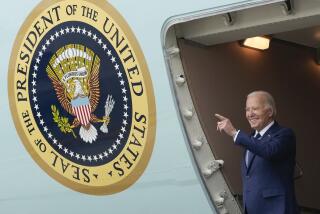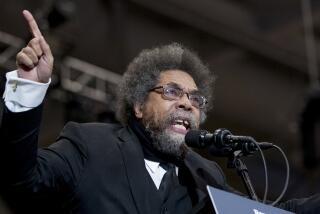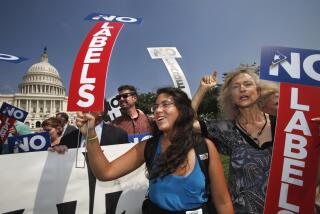Anti-Candidacy Surfaces in Campaign ’96
- Share via
When other countries sneer at what they see as predictable U.S. elections dominated by only two parties, some historians point to the races of 1824, 1860 and 1948, when four presidential candidates sparred in unusually lively contests.
Sporting no fewer than five candidates, this election year promises some fireworks of its own. Recent weeks have seen Harry Browne of the Libertarian Party and Ross Perot of the Reform Party join Bob Dole and Bill Clinton in the race to November. And on Monday, in a spartan celebration at UCLA where the beards and shorts of male delegates bore sharp contrast to the ties and suits of the major political conventions, Ralph Nader accepted the Green Party’s nomination for president.
Campaign mavens like Democratic Party consultant Bob Mulholland were quick to dismiss the impact of Nader’s candidacy as “none.” “The Green Party,” Mulholland said, “peaked the day they qualified [for the ballot]. . . . It’s sort of like the Greens and Nader need each other because neither of them is going anywhere.”
Nevertheless, Nader’s impact may be not as marginal as skeptics predict. In a Los Angeles Times poll conducted among California registered voters in March, for instance, Nader was favored by 7%, compared with 12% for Perot, 31% for Dole and 47% for Clinton. He is already on the ballot in 12 states, including California and New York, and Green Party activists say they hope to have him on at least 25 ballots by November. What concerns Democrats most is Nader’s argument that the president’s stands on “corporate welfare” (tax subsidies for private industry) and campaign finance reform wouldn’t even “qualify him as a liberal Republican in the 1970s.”
Nader says that his will be something of an anti-candidacy, spurning the trappings associated with national presidential campaigns. He will travel alone, without the usual entourage of aides and press deputies. He says he will spend no more than $5,000 of his own money. Asked how he plans to reach voters, Nader said he will “campaign through the free [news] media and make very brief sojourns through a number of states. . . . I like to engage in the urgent exhortation of the citizenry.”
He is trying, in other words, to run an ideas-based candidacy in America, a country that often votes more for personalities. It’s an honorable decision, if not a winning one.
More to Read
Get the L.A. Times Politics newsletter
Deeply reported insights into legislation, politics and policy from Sacramento, Washington and beyond. In your inbox twice per week.
You may occasionally receive promotional content from the Los Angeles Times.










